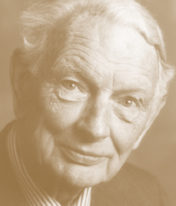Acceptance Speech
Your Royal Highness,
As Praeses of the Praemium Erasmianum it has fallen to you to present prizes to a long procession of men and women who have made outstanding contributions to the artistic and intellectual life of our continent. This year it gives me the greatest pleasure to accept the Erasmus Prize from your hands for contributions made to the study of Prehistory. The sense of honour that I feel at my name being added to the prestigious roll of previous winners is much enhanced by the circumstances under which you have presented me with the prize and not least by the gracious presence of Her Majesty and of so many members of the Royal Family.
To be awarded a prize which takes its name from an illustrious Dutchman who at the same time was a great citizen of Europe and through his writings did so much to open up our modern world of sensibility and thought is indeed a most signal honour. Now the master paid a number of visits to England and, as a Cambridge man, it is a source of pride that he taught there for a longer period than elsewhere in my country.As a former Master of Peterhouse, the oldest college in Cambridge and one situated only a couple of hundred meters or so upstream from Queens where Erasmus lodged between 1511(c)14,I can claim a slight, although tenuous, link. As we know from his correspondence Erasmus counted among his closest Cambridge friends John Watson who was a fellow of Peterhouse under my thirtieth predecessor as Master of the College; it is very thin, but nevertheless it is a link.
Since Prehistory only began to take shape some three centuries or so after his death Erasmus himself could hardly have been aware of the subject. Yet prehistorians, like those who work in many of the fields recognized by the award of the Erasmus Prize, realize how much they owe to a man who took such an important part in freeing Christendom from superstition and making possible the growth of modern consciousness. One aspect of this is the way we have come during recent centuries to appreciate that the world and indeed the very universe in which we live have evolved over immense periods of time.
If we turn to palaeontology to tell us about our biological evolution it is to prehistory that we look for evidence of the evolution of specifically human patterns of behaviour. The artefacts recovered by archaeology tell us not merely how our forebears adapted to and modified their environments but how they learnt to shape their behaviour to accord with cultural values rather than merely with biological imperatives. As contemporary history reminds us we are human to the extent that we are able to chose between alternatives. You have shown your appreciation of the significance of the study of prehistory by awarding it the Erasmus Prize.
May I say how much I appreciate the care there has been taken to ensure that this occasion has been pleasureable as well as memorable to me personally. The brave sound of the Danish lurer is a tuneful reminder that prehistoric people were far from living by bread alone. Moreover they remind me very vividly how much I owe to the example of Danish prehistorians. For one thing they set me a standard when I came to write my doctoral dissertation on the Mesolithic Age in Britain dealing with the British evidence for the cultural life of the hunter-fisher people of the early Postglacial period. Many years later I had the privilege of teaching the future Queen of Denmark when she came to Cambridge as Princess Margarethe to take her Diploma.
Similarly the film, which we have just seen, illustrating the work on The Somerset Levels Project, reminds me of my early association with zoning postglacial deposits in the Somerset Levels and in the Cambridge of Fenland by means of archaeology and pollen-analysis. The choice of this film is all the more satisfying to me that it has been made by Professor John Coles, who we are delighted to see that he is here present with us – I wrote this before I knew he was going to be here – one of my most brilliant former pupils and later my close colleague as editor of the Prehistoric Society and a leading member of the staff of the Department of Archaeology at Cambridge.
In conclusion I thought you would like to know how I intend to use the Erasmus Prize which has been such an honour to receive. I intend to use it to promote and to reward fellow prehistorians for the contributions they are making to a subject whose importance you have indicated by awarding this prize to Prehistory.I am very glad to say that the Prehistoric Society has undertaken to administer a Europa Fund to provide an annual monetary prize and that the British Academy has agreed to accept an endowment for a medal to recognize achievements in Prehistory comparable to those it already awards to leading scholars in other fields. In this way I hope your action in awarding me the Erasmus Prize as a prehistorian will help to further the wider recognition of the subject in our continent as a whole.
